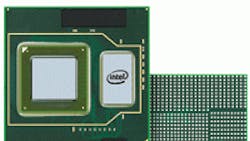Intel Moves to Speed Up and Shrink Industrial Computing
Not so long ago, computers filled entire rooms. Then they moved from closets, to our desks, and now rest in our hands. At the rate technology is developing, it wont be long before theyre in every object we can imagine.
But the realization of a smarter world has created an almost insatiable demand for computational power. Companies like IBM, HP and Intel are increasingly searching for ways to accelerate hardware.Intel recently detailed plans in its bid to offer a new version of its Atom processor, the E600C, which is normally used for lower-end netbooks, that will now be packaged with a different sort of chip supplied by Altera. Together, the combination will be targeted for embedded applications, which refers loosely to anything from cars, medical devices, office equipment, to industrial devices.
Intel has gone to great lengths to diversify beyond its PC market, and the partnership with Altera will help facilitate this. General purpose chips, such as the Atom, by themselves cant alone handle industrial plant-floor applications.
Financial firms, for instance, have used FPGAs to hasten financial calculations, while oil and gas companies use the chips to quicken the computing process of geological data.
Intel believes packaging the E600C with FPGA will allow for a wider range of products, embedded with task-specific chips, to be brought to market faster without having to perform extensive hardware changes. That means the new evolution of the Atom could be custom tailored for industrial machines, portable medical equipment, communications gear, vision system, VoIP devices, high-performance programmable logic controllers and embedded computers.
Manufacturers want to converge their IT and factory control systems, explained Intels Ian Gilvarry, who serves as strategic market manager for its industrial automation group, in an interview with IndustryWeek. One of the biggest drivers is to get access to real-time data on factory systems to support decision-making. And more and more, youre seeing that manufacturers want to be able to take applications that have run on industrial PCs and want them scaled further and further into industrial control devices. Thats where the technology is going.
